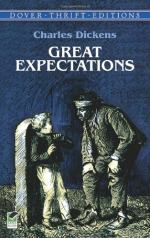We thought it best that he should stay in his own rooms, and we left him on the landing outside his door, holding a light over the stair-rail to light us down stairs. Looking back at him, I thought of the first night of his return when our positions were reversed, and when I little supposed my heart could ever be as heavy and anxious at parting from him as it was now.
Old Barley was growling and swearing when we repassed his door, with no appearance of having ceased or of meaning to cease. When we got to the foot of the stairs, I asked Herbert whether he had preserved the name of Provis. He replied, certainly not, and that the lodger was Mr. Campbell. He also explained that the utmost known of Mr. Campbell there, was, that he (Herbert) had Mr. Campbell consigned to him, and felt a strong personal interest in his being well cared for, and living a secluded life. So, when we went into the parlour where Mrs. Whimple and Clara were seated at work, I said nothing of my own interest in Mr. Campbell, but kept it to myself.
When I had taken leave of the pretty gentle dark-eyed girl, and of the motherly woman who had not outlived her honest sympathy with a little affair of true love, I felt as if the Old Green Copper Rope-Walk had grown quite a different place. Old Barley might be as old as the hills, and might swear like a whole field of troopers, but there were redeeming youth and trust and hope enough in Chinks’s Basin to fill it to overflowing. And then I thought of Estella, and of our parting, and went home very sadly.
All things were as quiet in the Temple as ever I had seen them. The windows of the rooms on that side, lately occupied by Provis, were dark and still, and there was no lounger in Garden Court. I walked past the fountain twice or thrice before I descended the steps that were between me and my rooms, but I was quite alone. Herbert coming to my bedside when he came in — for I went straight to bed, dispirited and fatigued — made the same report. Opening one of the windows after that, he looked out into the moonlight, and told me that the pavement was a solemnly empty as the pavement of any Cathedral at that same hour.
Next day, I set myself to get the boat. It was soon done, and the boat was brought round to the Temple stairs, and lay where I could reach her within a minute or two. Then, I began to go out as for training and practice: sometimes alone, sometimes with Herbert. I was often out in cold, rain, and sleet, but nobody took much note of me after I had been out a few times. At first, I kept above Blackfriars Bridge; but as the hours of the tide changed, I took towards London Bridge. It was Old London Bridge in those days, and at certain states of the tide there was a race and fall of water there which gave it a bad reputation. But I knew well enough how to “shoot” the bridge after seeing it done, and so began to row about among the shipping in the Pool, and down to Erith. The first time




